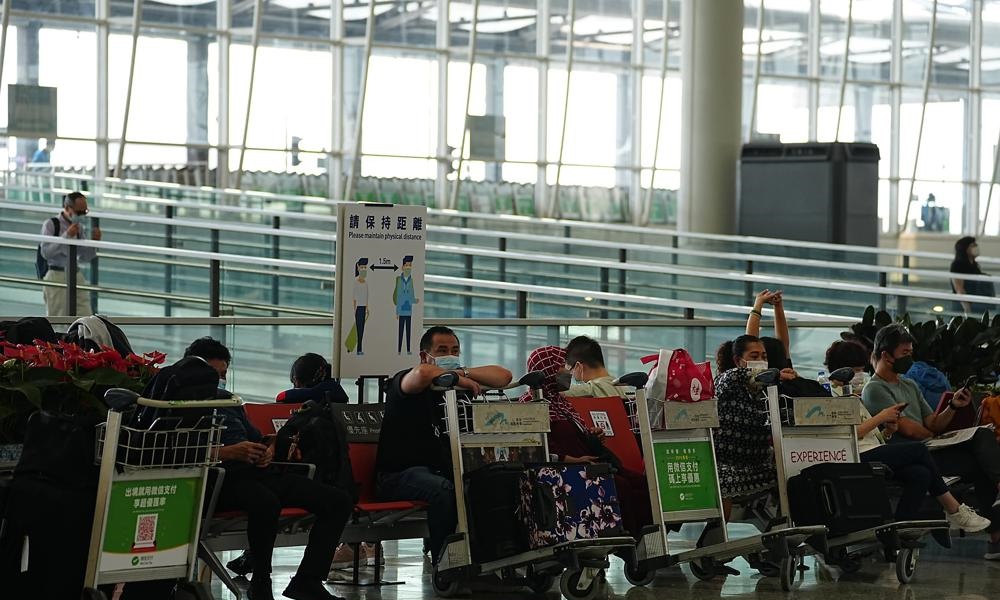COVID-19
Hong Kong to end mandatory hotel quarantine for travelers

Hong Kong’s leader announced the city would no longer require incoming travelers to quarantine in designated hotels as it seeks to remain competitive and open up globally after nearly two years.
Incoming travelers will also no longer need a negative PCR test within 48 hours before boarding a plane to Hong Kong, the city’s chief executive John Lee said Friday at a news conference. Instead, they will need to present a negative COVID-19 result from a rapid antigen test conducted within 24 hours before the flight, AP reported.
The measures will come into effect Monday.
“While we can’t control the trend of the epidemic, we must allow the maximum room to allow connectivity with the world so that we can have economic momentum and to reduce inconvenience to arriving travelers,” said Lee, who also said that authorities will not roll back the measures announced Friday.
He said that there must be a “balance between risks and economic growth.”
From Monday, travelers into Hong Kong will have to undergo three days of home monitoring. If they test negative for COVID-19 after three days, they will be allowed into venues such as restaurants and bars. They must also undergo several mandatory coronavirus tests on their fourth, sixth and seventh days in Hong Kong.
For nearly two years, Hong Kong required overseas arrivals in the city to serve a period of mandatory quarantine in designated hotels. At one point, the city had among the world’s longest quarantine periods at 21 days of mandatory isolation.
The easing of measures comes as Hong Kong prepares to hold several high-profile events, including the Rugby Sevens tournament in November and an international banking summit.
Neighboring Taiwan is expected to do the same next month. This leaves mainland China as one of the only places in the world that will still require travelers to quarantine on arrival.
Hong Kong has for most of the pandemic aligned with China’s “zero-COVID” strategy.
Over the past 2 1/2 years, Hong Kong authorities have imposed strict social distancing measures and locked down residential buildings with confirmed COVID-19 infections to mass-test residents.
As the rest of the world reopened borders, businesses urged Hong Kong authorities to come up with an exit strategy to the pandemic in order to remain competitive amid a brain drain as tens of thousands of residents left the city.
COVID-19
WHO declares end to COVID global health emergency

The World Health Organization said Friday that COVID-19 no longer qualifies as a global emergency, marking a symbolic end to the devastating coronavirus pandemic that triggered once-unthinkable lockdowns, upended economies and killed millions of people worldwide.
The announcement, made more than three years after WHO declared the coronavirus an international crisis, offers some relief, if not an ending, to a pandemic that stirred fear and suspicion, hand-wringing and finger-pointing across the globe, AP reported.
The U.N. health agency’s officials said that even though the emergency phase was over, the pandemic hasn’t finished, noting recent spikes in cases in Southeast Asia and the Middle East.
WHO says thousands of people are still dying from the virus every week, and millions of others are suffering from debilitating, long-term effects.
“It’s with great hope that I declare COVID-19 over as a global health emergency,” WHO Director-General Tedros Adhanom Ghebreyesus said.
“That does not mean COVID-19 is over as a global health threat,” he said, warning that new variants could yet emerge. Tedros noted that while the official COVID-19 death toll was 7 million, the real figure was estimated to be at least 20 million.
Tedros said the pandemic had been on a downward trend for more than a year, acknowledging that most countries have already returned to life before COVID-19.
He bemoaned the damage that COVID-19 had done to the global community, saying the pandemic had shattered businesses, exacerbated political divisions, led to the spread of misinformation and plunged millions into poverty.
When the U.N. health agency first declared the coronavirus to be an international crisis on Jan. 30, 2020, it hadn’t yet been named COVID-19 and there were no major outbreaks beyond China.
More than three years later, the virus has caused an estimated 764 million cases globally and about 5 billion people have received at least one dose of vaccine.
In the U.S., the public health emergency declaration made regarding COVID-19 is set to expire on May 11, when wide-ranging measures to support the pandemic response, including vaccine mandates, will end. Many other countries, including Germany, France and Britain, dropped most of their provisions against the pandemic last year.
When Tedros declared COVID-19 to be an emergency in 2020, he said his greatest fear was the virus’ potential to spread in countries with weak health systems.
Most recently, WHO has struggled to investigate the origins of the coronavirus, a challenging scientific endeavor that has also become politically fraught.
COVID-19
COVID-19 in Iran: Nearly 900 new cases, 24 deaths recorded

The Iranian health ministry announced on Sunday that more than 890 new cases of COVID-19 have been identified across the country during the past 24 hours, adding that 24 patients have died in the same period of time, Fars News Agency reported.
“A sum of 891 new patients infected with COVID-19 have been identified in the country based on confirmed diagnosis criteria during the past 24 hours,” the Iranian Health Ministry’s Public Relations Center said on Sunday, adding, “454 patients have been hospitalized during the same time span.”
The ministry’s public relations center said 611 people infected with COVID-19 are in critical condition.
COVID-19
China says 200 million treated, pandemic ‘decisively’ beaten

China says more than 200 million of its citizens have been diagnosed and treated for COVID-19 since it lifted strict containment measures beginning in November.
With 800,000 of the most critically ill patients having recovered, China has “decisively beaten” the pandemic, according to notes from a meeting of the ruling Communist Party’s all-powerful Politburo Standing Committee presided over by President and party leader Xi Jinping, AP reported.
China enforced some of the world’s most draconian lockdowns, quarantines and travel restrictions and still faces questions about the origins of the virus that was first detected in the central Chinese city of Wuhan in late 2019. Heavy-handed enforcement prompted rare anti-government protests and took a heavy toll on the world’s second-largest economy.
The official Xinhua News Agency quoted Xi as saying that policies to control the outbreak had been “entirely correct.” The abrupt lifting in November and December of the “zero COVID” policy that had sought to eliminate all cases of the virus led to a surge in infections that temporarily overwhelmed hospitals.
Case numbers have since peaked and life has largely returned to normal, although international travel in and out of China has yet to return to pre-pandemic levels.
China is now transitioning to a post-pandemic stage after a fight against the outbreak that was “extraordinary in the extreme,” Xinhua said.
The government will continue to “optimize and adjust prevention and control policies and measures according to the times and situations with a strong historical responsibility and strong strategic determination,” Xinhua said.
-

 Latest News5 days ago
Latest News5 days agoOver 1,000 Afghan refugees forced out of Pakistan in one day
-

 Sport3 days ago
Sport3 days agoAfghanistan beat Iraq 5-3, inch closer to Futsal World Cup berth
-

 Regional3 days ago
Regional3 days agoNew UK sanctions target Iranian drone industry
-

 Regional4 days ago
Regional4 days agoTurkey accuses U.S. of double standards over Gaza in rights report
-

 Latest News3 days ago
Latest News3 days agoEU allocates 17 million euros to support Afghans on the move
-

 Latest News2 days ago
Latest News2 days agoPakistan extends registered Afghan refugees’ stay till June 30
-

 World4 days ago
World4 days agoUS student protests over Gaza intensify despite arrests
-

 Regional2 days ago
Regional2 days agoChina to host Hamas, Fatah for Palestinian unity talks


























